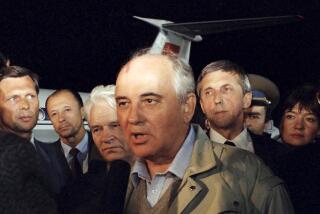Two Top Soviet Mayors Quit Party : Dissent: The Moscow and Leningrad officials cite the ‘inability of the party’ to steer the nation toward a new society.
- Share via
MOSCOW — Following the lead of Boris N. Yeltsin, the populist president of the Russian Republic, the radical mayors of Moscow and Leningrad quit the Soviet Communist Party on Friday, declaring that the party had shown its inability to steer the nation toward a new society.
Mayors Gavriil K. Popov of Moscow and Anatoly A. Sobchak of Leningrad said in a joint statement that they are leaving the party because the 28th Communist Party Congress, which ended Friday, “showed the complete inability of the party to offer the country a real program of transition to a new society.”
“Recognizing all the responsibilities before the people and history, we have taken a decision in the situation that arose to leave the Communist Party in order to help create a multi-party system,” Popov and Sobchak said.
But President Mikhail S. Gorbachev, criticizing the desertions from his party’s ranks, declared that he would not be swayed.
“Those who leave (the party) now and seek refuge elsewhere, I view with contempt,” he told CBS News in a Kremlin interview. “There is no question--I am not veering from my course, and I have many supporters.”
Gorbachev said that he had expected Yeltsin’s move, but was not worried by it.
“I regret it politically,” he said. “I think it was the logical consequence of all his political thinking. I don’t see any great achievement, either for him or for us.”
The mayors’ resignations, however, appeared certain to aggravate the first split in the Communist Party since Vladimir I. Lenin, the Bolshevik revolutionary, forged a unified party from diverse and contentious factions and with iron discipline founded the Soviet Union.
Popov, 53, a free-market economist and a founder, with Yeltsin, of the Inter-Regional Group made up of radical deputies in the national parliament, was elected mayor of Moscow in April. Before the party congress, Popov said that if conservatives carried the day, he would turn in his party card.
Sobchak, also 53, is dean of the law faculty at Leningrad State University and well known for his eloquent, pro-reform speeches in the Supreme Soviet, the country’s legislature. Elected mayor of Leningrad in May, he has been in the forefront of the struggle to establish the rule of law in place of the often arbitrary decisions of the Communist Party apparatus.
Yeltsin, who had stunned the party congress Thursday with his resignation, asked his colleagues in the Russian Supreme Soviet, the legislature of the country’s largest republic, not to question his decision.
“You must understand that it was made with a heavy heart,” he said Friday.
Father Gleb Yakunin, an outspoken Russian Orthodox priest and a member of the Russian Supreme Soviet, applauded Yeltsin’s withdrawal as “a real contribution to the separation of the Soviet Communist Party from the state, a step towards creating a multi-party parliamentary system in the republic.”
Yeltsin had told the congress Thursday that he was leaving the Communist Party because he could not “obey the will of the people,” his mandate as the president of Russia, and obey all the policies of the party.
The congress, in a political wrist slap, voted Friday to withdraw Yeltsin’s credentials, which meant that he was no longer permitted to participate in the congress.
The leaders of the radical Democratic Platform, meanwhile, tried Friday to clarify their decision to break away and form a new party.
The group’s leaders told a news conference that they expected to organize a new party within several months that would be committed to remove the military and the KGB, the Soviet security agency, from party control.
They said they would also campaign to turn over the Communist Party’s property to the country’s newly elected legislatures and local councils on grounds that it had been “stolen” from the people over many decades. Other goals include an end to party control of the news media, formation of a multi-party, parliamentary democracy and establishment of a market economy.
But the Democratic Platform leaders, as well as their conservative rivals in the party, insisted that a “split” had not taken place. They contended that they were forging a “division” of the party and not a “split.”
“There is a substantial difference between the two notions of ‘split’ and ‘division,’ ” Vyacheslav N. Shostakovsky, Democratic Platform leader and the rector of the Moscow Higher Party School, told a press conference. “A split is something that breaks into pieces and will not necessarily come together again. A division is breaking off relations.”
Boris V. Gidaspov, the Communist Party leader in Leningrad and a prominent conservative, was incredulous that anyone could regard such a small number of people leaving as constituting a split.
“There was not a split,” he said. “Eight people left. Is that a split?”
Vladimir N. Lysenko, another founder of the Democratic Platform, said that 25 delegates to the congress had joined them so far, but added that their support is very broad and many other party members are expected to sign up soon.
Among those signing the Democratic Platform’s declaration on Thursday announcing plans for the new party was Sobchak.
More to Read
Sign up for Essential California
The most important California stories and recommendations in your inbox every morning.
You may occasionally receive promotional content from the Los Angeles Times.












